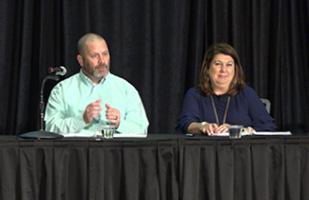Department of Justice Awards Ohio with Money for Veteran Treatment Courts

From left: Veteran and Honor Court Mentor Stephen Rangel and Stark County Common Pleas Court Judge Taryn Heath at the 2018 Specialized Docket Conference.

From left: Veteran and Honor Court Mentor Stephen Rangel and Stark County Common Pleas Judge Taryn Heath at 2018 Specialized Docket Conference.
The Bureau of Justice Assistance, a component of the U.S. Department of Justice, recently announced that Ohio has been selected as one of five states to receive veteran treatment court statewide strategic planning assistance.
Ohio will receive $200,000 to implement the plan. The money will be provided by the Center for Court Innovation.
“After a competitive application process, the Center for Court Innovation selected Ohio as one of the five states to receive this technical assistance based on Ohio’s dedication to implementing best practices and efficiency in veterans treatment court,” said Monica Christofferson, a senior program manager with the Center for Court Innovation.
“Center staff will work with stakeholders in Ohio to help set future goals for veterans treatment courts in the state, with the overarching goal of reaching more justice-involved veterans and connecting them with needed services.”
Currently, there are 22 certified veterans courts in Ohio. There are more than 248 specialized dockets in Ohio courts that bring together court and treatment professionals to work collaboratively to assist participants with treatment for behavioral health needs such as substance use disorder, trauma, and mental illness. The success of specialized dockets is measured by reduced recidivism, improved treatment, and cost savings. These dockets provide an alternative to punitive sanctions such as incarceration.
The Cleveland Municipal Court veterans treatment docket will benefit from the assistance. Since 2011, it has given veterans charged with misdemeanor offenses a second chance. Instead of possible jail, veterans get support including mentoring and substance use disorder treatment. If they fail to meet docket requirements, they will face court sanctions.
Judge Charles Patton Jr. took over the court in 2012 and said treating veterans suffering from problems associated with their service is the honorable thing to do. He recently cited an example of how times have changed since he was in private practice 20 years ago.
“I had a case in federal court with a defendant charged with drug possession,” Judge Patton said. “Before his pre-trial, we got him into the veterans affairs hospital for treatment. The judge sent the United States marshals to the hospital and arrested him. He never received treatment, went to jail, and when he got out, he ended up with more charges.”
“This does not happen with a specialized docket because we have proven time and time again that treatment works and jail does not. It’s certainly welcome news that the justice department has moved in this direction.”
“It is our hope to grow the 22 veterans courts in Ohio to assist the veterans that have sacrificed so much and to ensure fidelity to national best practices,” Ohio Supreme Court Chief Justice Maureen O’Connor said.


